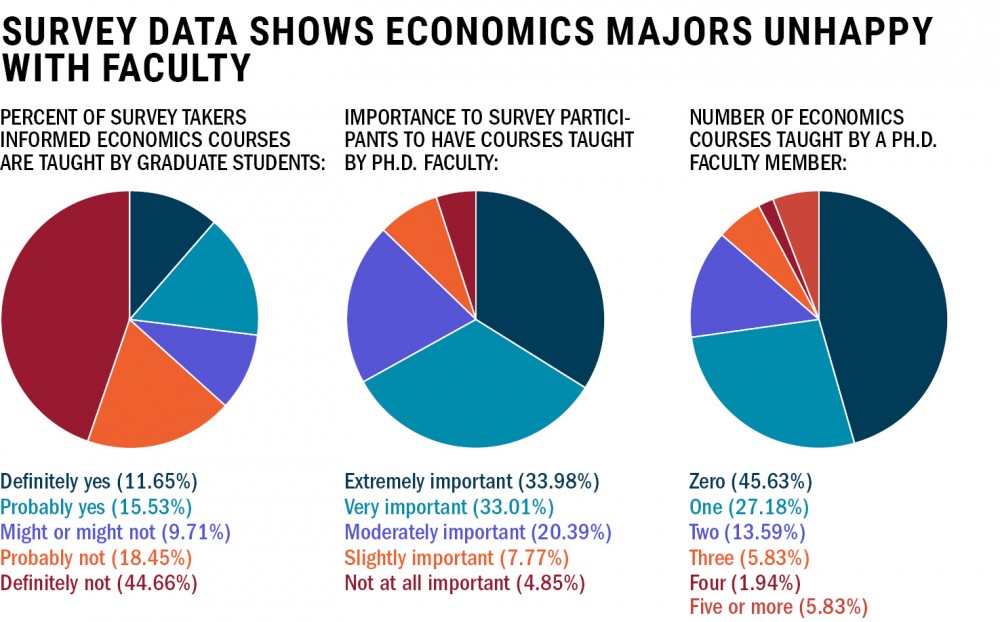While the University of Minnesota’s economics department publicizes high-ranking and award-winning faulty members, many undergraduates in the program say they aren’t ever taught by those faculty members.
A survey conducted earlier this year by the University College of Liberal Arts Student Board found that some economics students went through their entire undergraduate studies without having a class taught by a professor and that the University did not tell them this would be the case upon enrollment.
Student responses show that more than 95 percent of the 105 undergraduate economics majors who responded think it’s important that their classes are taught by doctoral faculty members.
But only seven of the 26 courses this semester that aren’t independent or directed studies are taught by professors, according to the economics department website. The rest are taught by graduate students or teaching assistants.
The survey also showed that about 46 percent of undergraduates haven’t had an economics class taught by a professor and about 63 percent said they were probably or definitely not aware upon enrollment that the majority of their classes would be taught by graduate students.
In an emailed statement, Gary Oehlert, associate dean for undergraduate education in CLA, said CLA administrators are “engaged in discussions about how to respond to areas of concern noted in the survey.”
The CLA Student Board decided to conduct the survey after students came to them with concerns about how the economics department is structured, CLA Board President Matthew Peterson said in an emailed statement.
The survey allowed students to anonymously comment about the department. One student wished for a “better faculty-student camaraderie and that [the University] wasn’t so dependent on grad students.”
Another complained that some graduate students are bad lecturers, unhelpful and apathetic. A different economics student called for more faculty members who could write letters of recommendation and offer research positions.
“It is disappointing to be graduating without ever being taught an economics course by a professor, whereas in my other majors I am able to get classes with distinguished faculty and experienced professors [with] ease,” a student said in the survey.
Economics department chair and professor Christopher Phelan said there are currently 19 active faculty members to spread out among undergraduate numbers that have swelled over the last several years.
“[Faculty members] do teach undergrad,” Phelan said. “One thing I want to point out is … maybe six years ago, we had about 400 majors. Now we have 1,100 to 1,200,” he said. “We’re delivering a very successful undergraduate experience. That’s why so many are choosing to be in our classes. We must be doing something right.”
Since the program has grown, Phelan said class sizes have increased from 35 to 70 students.
Economics junior Alex Porter said he heard the University’s economics program was highly ranked in the region long before he enrolled.
“I’d say I’ve probably only had two actual professors that were … not [teaching assistants] or grad students,” he said. “They may … know the material very well, but they really don’t have previous experiences with that in the real world yet.”
Paul Opheim, also an economics junior and one of the students surveyed, said so far all of his economics classes have been taught by graduate students. But, he said, that doesn’t bother him.
“I have never thought that any of the grad student teaching has been bad,” he said. “I know that a lot of people don’t agree with me on that.”
Dmitriy Rozenblat, president of the University’s Economics Student Organization and economics senior, said the organization appreciates the department and its efforts to engage undergraduates, but they “believe that limited instruction by economics faculty does a disservice to undergraduate students, especially those seeking recommendations for postgraduate studies or research experience.”
Rozenblat said students in the department would benefit from more classes taught by professors because they help students get involved in research projects.
“Being able to get to know [professors] is useful for getting research experience and getting advice and obviously letters of recommendation,” he said.
Rozenblat said he was drawn to the program because of its renowned faculty.
“The University has a top econ[omics] program,” he said. “I was not as aware of the lack of instruction when I was making my decision to come here.”








